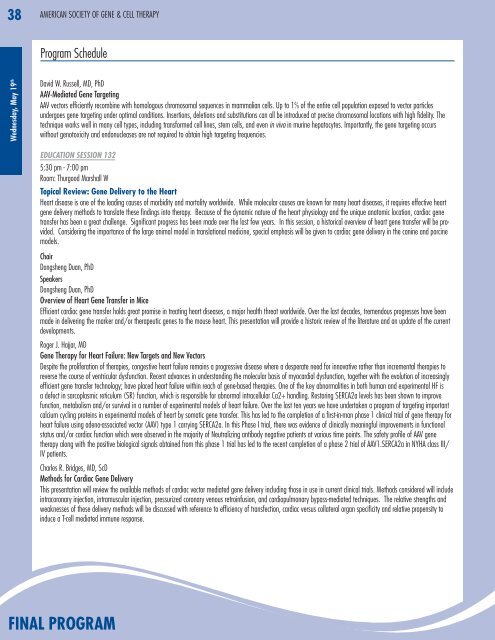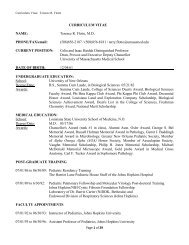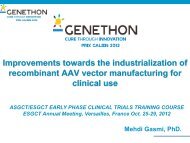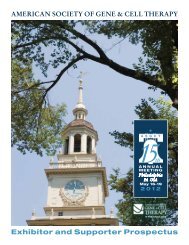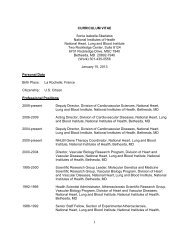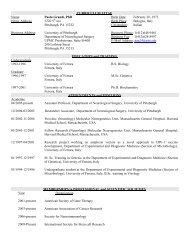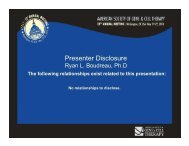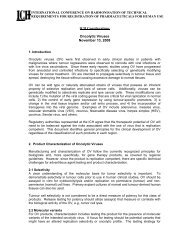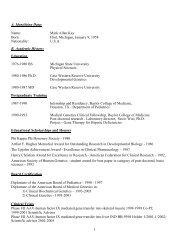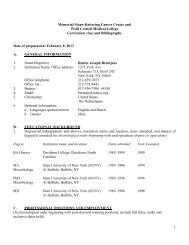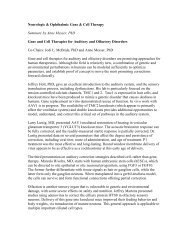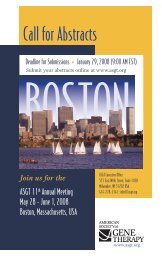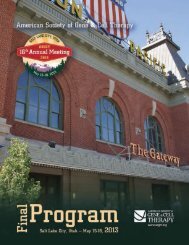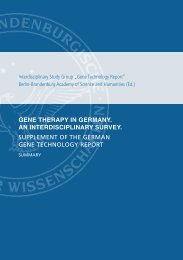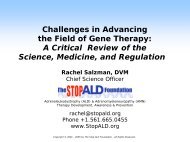FINAL PROGRAM - American Society of Gene & Cell Therapy
FINAL PROGRAM - American Society of Gene & Cell Therapy
FINAL PROGRAM - American Society of Gene & Cell Therapy
- No tags were found...
Create successful ePaper yourself
Turn your PDF publications into a flip-book with our unique Google optimized e-Paper software.
38<strong>American</strong> <strong>Society</strong> <strong>of</strong> <strong>Gene</strong> & <strong>Cell</strong> <strong>Therapy</strong>Program ScheduleWednesday, May 19 thDavid W. Russell, MD, PhDAAV-Mediated <strong>Gene</strong> TargetingAAV vectors efficiently recombine with homologous chromosomal sequences in mammalian cells. Up to 1% <strong>of</strong> the entire cell population exposed to vector particlesundergoes gene targeting under optimal conditions. Insertions, deletions and substitutions can all be introduced at precise chromosomal locations with high fidelity. Thetechnique works well in many cell types, including transformed cell lines, stem cells, and even in vivo in murine hepatocytes. Importantly, the gene targeting occurswithout genotoxicity and endonucleases are not required to obtain high targeting frequencies.Education Session 1325:30 pm - 7:00 pmRoom: Thurgood Marshall WTopical Review: <strong>Gene</strong> Delivery to the HeartHeart disease is one <strong>of</strong> the leading causes <strong>of</strong> morbidity and mortality worldwide. While molecular causes are known for many heart diseases, it requires effective heartgene delivery methods to translate these findings into therapy. Because <strong>of</strong> the dynamic nature <strong>of</strong> the heart physiology and the unique anatomic location, cardiac genetransfer has been a great challenge. Significant progress has been made over the last few years. In this session, a historical overview <strong>of</strong> heart gene transfer will be provided.Considering the importance <strong>of</strong> the large animal model in translational medicine, special emphasis will be given to cardiac gene delivery in the canine and porcinemodels.ChairDongsheng Duan, PhDSpeakersDongsheng Duan, PhDOverview <strong>of</strong> Heart <strong>Gene</strong> Transfer in MiceEfficient cardiac gene transfer holds great promise in treating heart diseases, a major health threat worldwide. Over the last decades, tremendous progresses have beenmade in delivering the marker and/or therapeutic genes to the mouse heart. This presentation will provide a historic review <strong>of</strong> the literature and an update <strong>of</strong> the currentdevelopments.Roger J. Hajjar, MD<strong>Gene</strong> <strong>Therapy</strong> for Heart Failure: New Targets and New VectorsDespite the proliferation <strong>of</strong> therapies, congestive heart failure remains a progressive disease where a desperate need for innovative rather than incremental therapies toreverse the course <strong>of</strong> ventricular dysfunction. Recent advances in understanding the molecular basis <strong>of</strong> myocardial dysfunction, together with the evolution <strong>of</strong> increasinglyefficient gene transfer technology; have placed heart failure within reach <strong>of</strong> gene-based therapies. One <strong>of</strong> the key abnormalities in both human and experimental HF isa defect in sarcoplasmic reticulum (SR) function, which is responsible for abnormal intracellular Ca2+ handling. Restoring SERCA2a levels has been shown to improvefunction, metabolism and/or survival in a number <strong>of</strong> experimental models <strong>of</strong> heart failure. Over the last ten years we have undertaken a program <strong>of</strong> targeting importantcalcium cycling proteins in experimental models <strong>of</strong> heart by somatic gene transfer. This has led to the completion <strong>of</strong> a first-in-man phase 1 clinical trial <strong>of</strong> gene therapy forheart failure using adeno-associated vector (AAV) type 1 carrying SERCA2a. In this Phase I trial, there was evidence <strong>of</strong> clinically meaningful improvements in functionalstatus and/or cardiac function which were observed in the majority <strong>of</strong> Neutralizing antibody negative patients at various time points. The safety pr<strong>of</strong>ile <strong>of</strong> AAV genetherapy along with the positive biological signals obtained from this phase 1 trial has led to the recent completion <strong>of</strong> a phase 2 trial <strong>of</strong> AAV1.SERCA2a in NYHA class III/IV patients.Charles R. Bridges, MD, ScDMethods for Cardiac <strong>Gene</strong> DeliveryThis presentation will review the available methods <strong>of</strong> cardiac vector mediated gene delivery including those in use in current clinical trials. Methods considered will includeintracoronary injection, intramuscular injection, pressurized coronary venous retroinfusion, and cardiopulmonary bypass-mediated techniques. The relative strengths andweaknesses <strong>of</strong> these delivery methods will be discussed with reference to efficiency <strong>of</strong> transfection, cardiac versus collateral organ specificity and relative propensity toinduce a T-cell mediated immune response.EXHIBITOR PROSPECTUSfinal program


